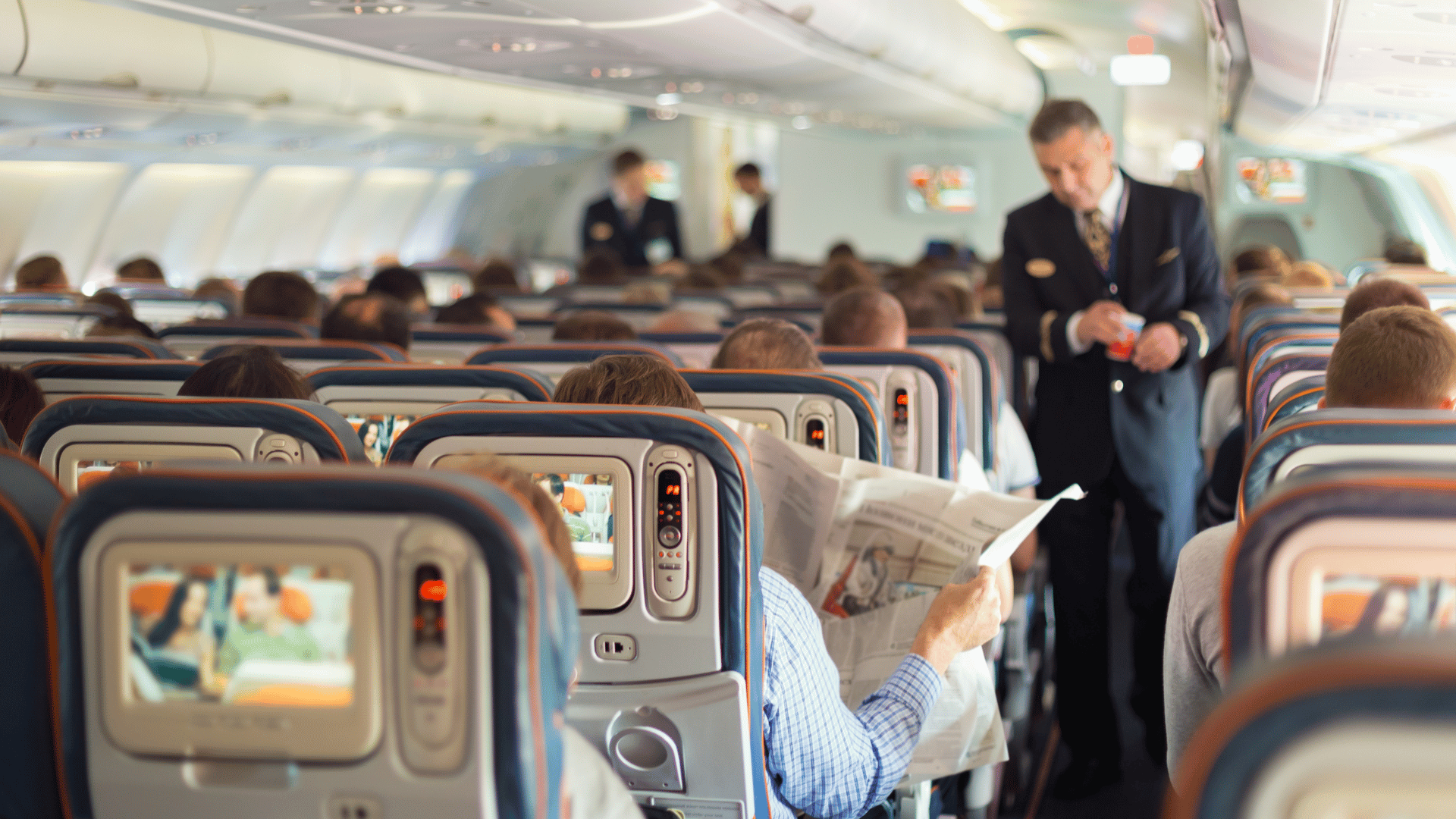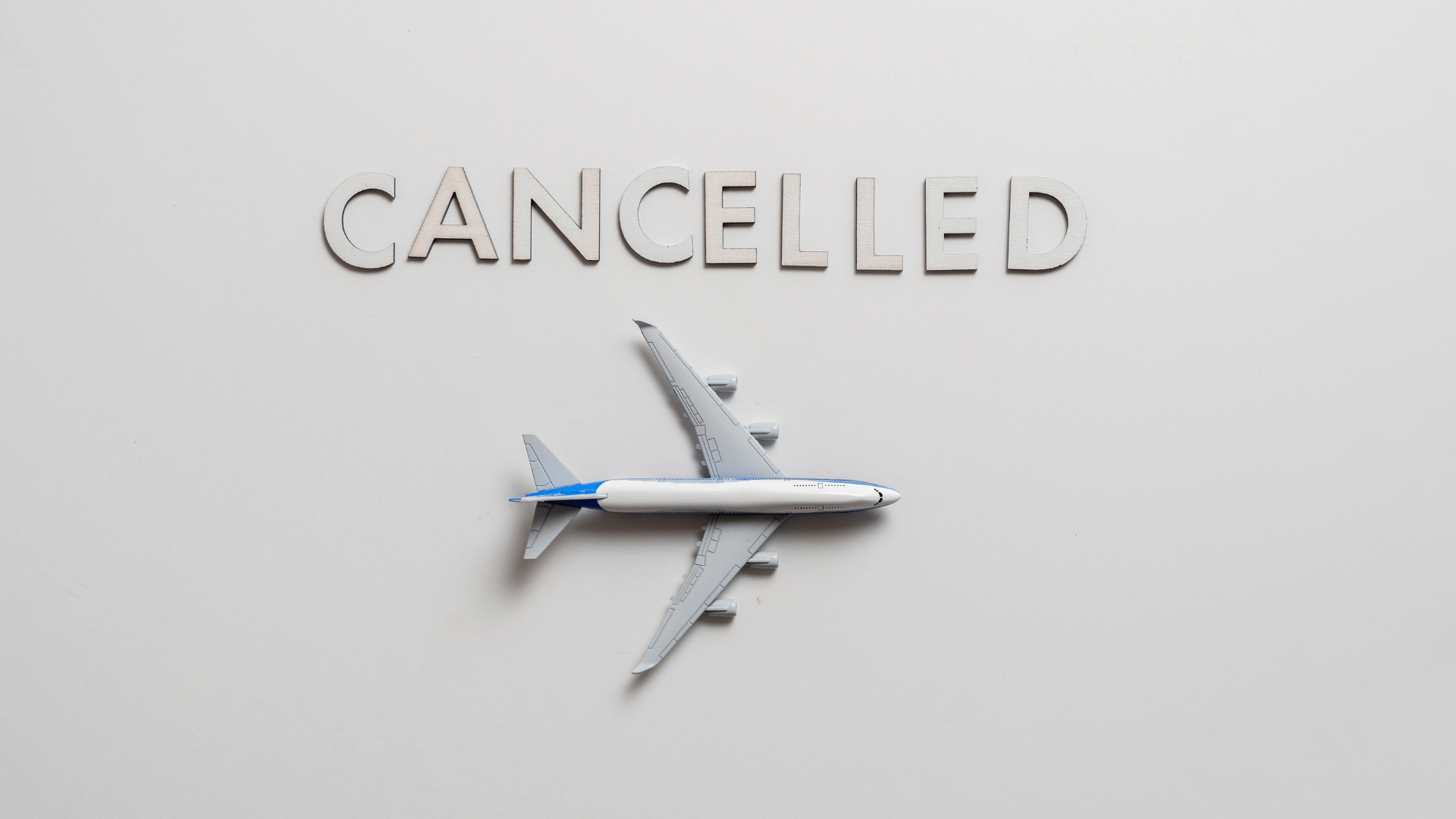What to Do When Your Flight is Cancelled

1. Explore Your Options: Refund or Rebooking
When your flight is cancelled, your first step is to check what the airline offers you:
Refund : If your flight is cancelled, you are eligible for a full refund, which will be returned to the original payment method used at the time of purchase. To ensure a seamless process, keep all relevant documents, such as your booking confirmation and cancellation notice, readily available.
Rebooking : In the event of flight cancellations, many airlines offer the option to rebook your flight without additional charges. You may have the flexibility to:
- Reschedule your flight for a later date.
- Select a different route to reach your destination.
These options are typically provided if the cancellation stems from the airline’s internal issues. Contact the airline promptly to explore the available alternatives and confirm any specific conditions.
By staying informed and proactive, you can navigate flight cancellations with minimal disruption to your travel plans.
If your flight is cancelled and the delay is significant—especially when the cause is within the airline’s control—passengers are entitled to certain services and compensations:
- Meals: Airlines are required to provide basic meals or offer meal vouchers to passengers affected by cancellations. This ensures that you can stay refreshed during the wait.
- Accommodation: Should a flight cancellation result in an overnight delay, the airline must arrange for hotel accommodation or alternative lodging.
- Transport to Accommodation: In cases where the airline provides accommodation, they are also responsible for arranging transport between the airport and the hotel, ensuring you get to your place of stay without additional hassle.
Compensation: If the cancellation is due to issues within the airline’s control—such as technical failures or operational disruptions—you may be entitled to compensation. The amount of compensation depends on the flight distance and the length of the delay, with higher compensation typically provided for long-haul flights.
Airline Responsibilities Under Indian Aviation Regulations

In addition to the global guidelines set forth by the Montreal Convention, India’s Directorate General of Civil Aviation (DGCA) has established a set of detailed regulations aimed at protecting the rights of air passengers, particularly in cases of flight cancellations. These regulations are designed to ensure that passengers receive fair treatment and appropriate support, both for domestic flights within India and for international flights departing from or arriving in India.
The DGCA’s regulations provide clear rules that airlines must follow in the event of flight disruptions, with the primary goal of enhancing the overall passenger experience. They ensure that passengers are well-informed, receive necessary assistance, and are entitled to compensation if cancellations are caused by factors within the airline’s control.
Scope and Coverage of DGCA Regulations

These regulations cover a broad range of flight scenarios:
- Domestic Flights: All flights operating within Indian airspace, connecting cities and regions across the country, are governed by the DGCA’s guidelines.
- International Flights: The rules also apply to international flights that either depart from or arrive in India, guaranteeing that passengers traveling both domestically and internationally are equally protected under the same framework.
By extending the rules to both domestic and international flights, the DGCA ensures that passengers’ rights are consistently upheld, regardless of the flight’s origin or destination. This provides a level of certainty and fairness for travellers, particularly in cases where cancellations or delays are caused by issues that are the responsibility of the airline.
Through these comprehensive regulations, the DGCA has created a structured and transparent system that ensures passengers understand their rights in the event of a flight cancellation. At the same time, airlines are provided with clear guidelines on how to handle cancellations and delays in a manner that prioritizes passenger convenience and satisfaction.
Passenger Rights in Case of Flight Cancellations

Flight cancellations can disrupt your travel plans, but understanding your rights ensures you can manage the situation effectively. Here’s what you need to know:
Notification of Flight Cancellations
Airlines are required to notify passengers of any flight cancellations at least 24 hours before the scheduled departure time. If a cancellation occurs within this 24-hour window, the airline must compensate passengers for the inconvenience caused, as per regulations.
Compensation for Flight Cancellations
When a cancellation results from factors within the airline’s control, passengers are entitled to compensation for flight cancellations. The amount is determined by factors such as the flight distance and timing of the cancellation. If the cancellation happens less than 24 hours before departure, compensation is guaranteed under DGCA regulations.
Refunds for Cancelled Flights
If you choose not to continue with your travel plans following a flight cancellation, the airline must issue a full refund, including taxes and surcharges. This applies regardless of the ticket’s fare conditions, ensuring passengers are not financially penalized for cancellations made by the airline.
Rebooking on Alternative Flights
For passengers affected by flight cancellations, airlines are obligated to rebook them on the next available flight to their destination. If the next flight does not suit the passenger’s needs, the airline must offer the option to rebook on a later flight at no additional cost.
Understanding your rights can help you handle flight cancellations efficiently, ensuring you receive the compensation, refund, or rebooking option you deserve.
Passenger Rights in the Event of Flight Cancellations Due to Force Majeure (Uncontrollable Events)

Sometimes, airlines may need to cancel flights due to events beyond their control. These events, known as force majeure, include situations that are unpredictable and unavoidable, such as extreme weather conditions, natural disasters, political instability, security threats, or labor strikes. In such cases, the airline is generally not held liable for the flight cancellations, and its responsibilities to passengers are more limited.
While airlines may not owe compensation for flight cancellations caused by force majeure, they are still expected to provide assistance where possible. This can include offering refunds for unused tickets or facilitating rebooking on a later flight, depending on the airline’s policies. Understanding the implications of force majeure and the airline’s obligations can help passengers navigate such situations effectively.
No Compensation for Force Majeure Events

When a flight cancellation is caused by a force majeure event, the airline is typically not obligated to provide compensation, as the disruption results from circumstances beyond the airline’s control. Under Indian aviation regulations, passengers are generally not entitled to financial compensation, such as reimbursements, travel vouchers, or other forms of compensation, for flight cancellations caused by such uncontrollable events.
That being said, while compensation is not required, airlines are still responsible for offering support and assistance to passengers affected by these situations.
Provision of Reasonable Care and Assistance

Although compensation is not mandatory in cases of force majeure, airlines still have a duty to offer reasonable care to affected passengers. This care may include the following:
- Meals and Refreshments: If your delay or cancellation extends over a period of time, the airline must provide basic meals or refreshments or offer vouchers for food and beverages.
- Accommodation: If the cancellation requires an overnight stay, the airline must arrange hotel accommodation or assist with finding suitable lodging. This ensures you are not left without a place to stay while waiting for the next flight.
- Communication: Airlines are required to keep you informed about the status of your flight, the rebooking process, and the ongoing situation. This communication may come in the form of text messages, emails, or announcements at the airport.
Documenting Your Communications

While airlines are not obligated to provide compensation for force majeure cancellations, it’s still important to document all communication with the airline. Keep copies of emails, text messages, and receipts for any expenses incurred due to the cancellation. This documentation may prove helpful if you need to request reimbursement for out-of-pocket expenses or if the airline offers any goodwill gestures, such as meal vouchers, hotel accommodations, or frequent flyer miles as a token of appreciation for your patience.
While additional compensation or benefits is not a legal requirement, some airlines may voluntarily offer these as a gesture of goodwill, particularly in difficult circumstances. Therefore, it’s always worth staying in contact with the airline’s customer service to inquire about any potential support they may be able to provide.
Key Points to Remember:
- Force majeure events such as weather conditions, strikes, or security issues can lead to flight cancellations where the airline is not at fault.
- Airlines are not legally required to offer compensation for cancellations caused by uncontrollable events, but they must still provide rebooking or refund options.
- Airlines are required to offer reasonable care, including meals, accommodation, and communication, during extended delays or cancellations caused by force majeure.
- Always keep records of all communication with the airline, as it may be necessary for reimbursement claims or to secure goodwill offers.
In these challenging situations, staying informed, maintaining flexibility with your travel plans, and keeping open communication with the airline is key to receiving the appropriate support and assistance.
What to Do If Your Domestic Flight Is Cancelled: A Complete Step-by-Step Guide

Step 1: Confirm the Reason for the Cancellation
Clarify the Cause of the Cancellation
As soon as you’re informed about the cancellation, your first priority should be to understand why it happened.
- Ask the Airline: Approach the airline staff at the counter or reach out to their customer service team to get a clear explanation of the cause. It could be due to weather conditions, aircraft maintenance, crew shortages, or other operational reasons.
- Impact on Compensation: Knowing the cause of the cancellation will determine your eligibility for compensation. If it’s a fault on the airline’s part, such as technical issues or overbooking, you may be entitled to compensation under the Directorate General of Civil Aviation (DGCA) guidelines. However, if the cancellation was caused by factors beyond the airline’s control, such as weather disruptions or strikes, compensation may not apply.
Step 2: Contact the Airline’s Customer Service
Speak with Airline Representatives
At the Airport: If you’re at the airport, head straight to the airline’s customer service desk for immediate assistance. Be polite yet firm when discussing rebooking options or your entitlement to a refund due to the flight cancellation. Ensure you inquire about alternative flights and any additional support the airline is required to provide in case of prolonged delays.
On the Phone or Online: If you’re not at the airport, contact the airline’s customer service via their helpline or official website to address the flight cancellation. This allows you to explore rebooking options, refunds, or other solutions without needing to be physically present. Stay prepared with your booking details and any communication from the airline regarding the flight cancellation to streamline the process.
Inquire About Rebooking or Refund
Rebooking: The airline is obligated to rebook you on the next available flight to your destination at no additional cost. Be sure to request confirmation of your new flight details. If time is a concern, inquire whether they can accommodate you on an alternative route or with a different carrier to minimize delays caused by the flight cancellation.
Refund: If you choose not to travel or if no suitable alternatives are provided, inquire about the refund process. Confirm whether you are eligible for a full refund, which should cover the entire ticket price, taxes, and any additional charges. Understanding your rights during flight cancellations ensures you get fair treatment and avoid unnecessary financial losses.
Step 3: Get a Written Confirmation of the Cancellation
Document the Cancellation
Request a Written Acknowledgment: Always request a written statement confirming the flight cancellation. This formal documentation is essential if you need to make a claim, seek compensation, or escalate the situation at a later stage. Having a record of the cancellation ensures that your rights are protected.
Proof for Claims: A written confirmation acts as proof of the flight cancellation, which is crucial for filing complaints, claiming compensation, or resolving any disputes that may arise in the future. Keeping this documentation on hand will help streamline the process and ensure that you receive fair treatment.
Step 4: Explore Alternative Travel Options
Look for Other Flights or Routes
Alternative Flights: If the airline is unable to rebook you immediately, ask if there are alternative flights available from nearby airports or different routes that could help you reach your destination sooner. In some cases, the airline may even rebook you on another carrier at no extra cost, especially if the flight cancellation is due to internal issues.
Request a Full Refund: If no suitable alternatives are available or you decide not to travel, request a full refund. Ensure that the refund covers the entire fare, including taxes, surcharges, and any additional fees, and that it is processed promptly to avoid any further inconvenience due to the flight cancellation.
Step 5: Understand the Compensation Process
Know Your Rights to Compensation
- Eligibility for Compensation: If the cancellation was within the airline’s control (e.g., due to maintenance issues, overbooking, or staffing problems), you may be entitled to compensation under DGCA regulations. Compensation can include cash, travel vouchers, or additional services such as meals and accommodation.
- Keep All Receipts: If the cancellation causes additional costs such as meals, accommodation, or transportation, always keep your receipts. These can be submitted as part of your compensation claim if you are entitled to reimbursement due to the airline’s fault.
Step 6: File a Complaint If Necessary
File a Formal Complaint with the DGCA
- Escalating the Issue: If you’re not satisfied with the resolution offered by the airline, or if they fail to meet their obligations, you can file a formal complaint with the Directorate General of Civil Aviation (DGCA). The DGCA offers an online grievance redressal mechanism for passengers who face issues with airlines operating in India.
- Further Escalation: If you’re unable to resolve the matter through the airline or the DGCA, consider escalating the issue through other channels. This could include seeking assistance from a consumer protection forum or taking legal action if necessary.
What to Do If Your International Flight Is Cancelled
While understanding your rights is crucial when a flight is cancelled, knowing the correct steps to take can significantly reduce the inconvenience and help ensure you receive the compensation you are entitled to. Here’s a detailed guide on what to do if your international flight is cancelled:
Step 1: Confirm the Cause of the Cancellation
- Ask for an Explanation: Upon learning that your flight has been cancelled, it’s essential to understand why. Inquire with the airline about the specific cause—whether it was due to a fault within the airline’s control (such as mechanical issues or staffing shortages) or an uncontrollable event (force majeure) like extreme weather or a strike.
- Impact on Compensation: The reason for the cancellation will determine whether you are entitled to compensation. If the airline is at fault, you may be eligible for compensation under the Montreal Convention or Indian aviation regulations. However, in cases of force majeure, compensation may not be due.
Step 2: Contact the Airline’s Customer Service
Speak to Airline Representatives: Visit the airline’s customer service desk at the airport or contact their helpline to speak with an agent. Be polite, yet assertive when expressing your concerns and exploring your options following a flight cancellation. Clear communication will help ensure that you are offered the best available solutions for your situation.
Inquire About Rebooking or Refund: Request information about rebooking you on the next available flight to your destination. If the flight cancellation was unexpected, explain your situation and ask about all available options for alternative flights or a refund. Be sure to clarify the airline’s policy on refunds or compensation, depending on the reason for the cancellation, to understand your entitlements fully.
Step 3: Request a Written Statement for Your Claim
Documentation is Key: If you plan to claim compensation or request a refund after a flight cancellation, always ask for a written statement or formal acknowledgment from the airline. This is essential for your records and can be crucial if you need to follow up or escalate the matter at a later stage.
Proof of Cancellation: A written statement serves as solid proof of the flight cancellation, providing concrete evidence when filing a complaint, claiming compensation, or resolving any issues in the future. Having this documentation ensures that you are equipped to handle the situation effectively and assert your rights.
Step 4: Explore Alternative Travel Options
Check for Other Flights: If the airline is unable to rebook you on the next available flight, inquire about alternative routes or flights operated by other airlines. In some cases, they may accommodate you on a different carrier at no additional cost, especially if the flight cancellation was due to factors within their control.
Request a Full Refund: If the airline cannot provide a satisfactory solution or if rebooking on a different route isn’t possible, request a full refund of your ticket. Ensure that the refund includes the entire fare, along with taxes and surcharges, and that it is processed without unnecessary delays following the flight cancellation.
Step 5: Understand the Compensation Process
- Know Your Rights: Based on the cause of the cancellation, ask the airline about your entitlement to compensation. If the cancellation was due to the airline’s fault, you should be eligible for compensation as per the Montreal Convention or DGCA regulations.
- Keep All Receipts: If the airline is responsible for the delay, you may be entitled to compensation for additional expenses incurred, such as meals, hotel stays, or transport. Always keep receipts for these expenses, as they can be submitted as part of your compensation claim.
Step 6: File a Complaint if Necessary
File with the DGCA: If the airline fails to fulfil its obligations or doesn’t provide a satisfactory resolution following a flight cancellation, you can lodge a formal complaint with the Directorate General of Civil Aviation (DGCA) in India. The DGCA offers an online grievance redressal platform to assist passengers in addressing issues with airlines operating in the country.
Escalate the Issue: If the matter remains unresolved, consider escalating it through alternative channels. This might include taking legal action or involving consumer protection agencies to ensure that your rights are upheld and appropriate action is taken regarding the flight cancellation.
Conclusion
Flight cancellations, whether for domestic or international journeys, can disrupt your travel plans and cause significant frustration. However, knowing your rights can empower you to handle the situation with confidence. Airlines are obligated to notify passengers promptly of any flight cancellations and present clear options for rebooking or refunds. Additionally, if cancellations lead to significant delays or require an overnight stay, airlines must provide support, including meals and accommodations.
When flight cancellations are caused by airline-related issues, such as overbooking or operational errors, passengers may be entitled to compensation. Conversely, disruptions due to uncontrollable factors like adverse weather or labor strikes generally do not qualify for compensation.
To further protect yourself, consider purchasing travel insurance, which can cover additional expenses such as rebooking fees or emergency accommodations. If you encounter difficulties in resolving the matter with the airline, you have the option to lodge a formal complaint with the Directorate General of Civil Aviation (DGCA) or seek assistance through consumer protection organizations.
By staying informed about your rights and taking proactive steps, you can mitigate the inconvenience of flight cancellations and ensure a smoother resolution, whether travelling within India or internationally.




